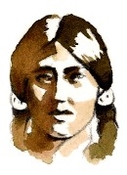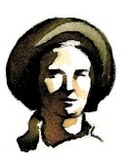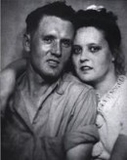Elvis Genealogy
Each of us stands on the shoulders of our ancestors. So too Elvis; his genealogy provides a fascinating view of the influences that help form him. Our story begins with Elvis's maternal heritage through his mother, Gladys.
Elvis's great-great-great-grandmother, Morning White Dove (1800-1835), was a full-blooded Cherokee Indian. She married William Mansell, a settler in western Tennessee, in 1818. William's father, Richard Mansell, had been a soldier in the Revolutionary War. Mansell is a French name--its literal translation is the man from Le Mans. The Mansells migrated from Norman France to Scotland, and then later to Ireland. In the 18th century the family came to the American Colonies. The appellation "white" in Morning Dove's name refers to her status as a friendly Indian. Early American settlers called peaceable Indians "white," while
"red" was the designation for warring Indians or those who sided with the British in the Revolutionary War. It was common for male settlers in the West to marry "white" Indians as there was a scarcity of females on the American frontier.
Like many young men in the American Southwest, William Mansell fought with Andrew Jackson in the Indian Wars of the early nineteenth century. He fought with Old Hickory in Alabama, at the Battle of Horseshoe Bend, and later in Florida too. Returning to Tennessee from the Indian Wars, William Mansell married Morning White Dove. Elaine Dundy says of the marriage, he (William Mansell) gained "age-old Indian knowledge of the American terrain; of forests and parries; of crops and game; of protection against the climate; of medicine lore, healing plants as well as something in which the Indians were expert--the setting of broken bones." Moreover, added to Elvis's lineage were Morning White Dove's ruddy Indian
complexion and fine line of cheek.
Like many other settlers, the newlyweds migrated to Alabama from Tennessee to claim lands garnered in the Indian Wars. The Mansells settled in Marion County in northeast Alabama near the Mississippi border. The Scots-Irish, like William Mansell, were the predominant settlers of Alabama. One-tenth of the population in colonial America was Scots-Irish at the time of the American Revolution. And a
very interesting group they were. The Anglican Reverend Woodmason had this to say about the Scots-Irish women of William Mansell's day. "They wore nothing but thin shifts and a thin petticoat underneath. They are sensual and promiscuous. They draw their shift as tight as possible to the body, and pin it close, to show the roundness of their breasts, and slender waists (for they are generally fined shaped) and draw their petticoat close to their hips to show the fineness of their limbs--so that they might as well be in puri naturalibus."
The Scots-Irish in America were a passionate community living close to the earth. They disdained the niceties of their British neighbors. Of this Reverend Woodmason had to say," they delight in their present low, lazy, sluttish, heathenish, hellish life, and seem not desirous of changing it. These people despise knowledge, and instead of honoring a learned person...they despise and ill-treat them..." There were other views on the passionate lifestyle of the Scots-Irish, however. James Hall of Philadelphia described a young, Scots-Irish frontiersman in this way. "He strode among us with the step of Achilles...I thought I could see in that man, one of the progenitors of an unconquerable race; his face presented the traces of a spirit quick to resent--he had the will to dare, and the power to execute, there was something in his look which bespoke a disdain of control, and an absence of constraint in all his movements indicating an habitual independence of thought and action."
Think of Elvis in these words: the will to dare and the power to execute, a disdain of control in all his movements indicating a habitual independence of thought and action. This is the Scots-Irish heritage from which Elvis Presley issued. In his genes he carried an independence of blood, the will to dare and the power to execute. Many influences formed Elvis Presley besides the genealogical, yet this description has a haunting accuracy. Morning White Dove and William Mansell prospered in Alabama. Their land was fertile and they built a substantial house near the town of Hamilton. They had three offspring, the eldest of who was John Mansell, born in 1828, and Elvis's great-great grandfather. Elaine Dundy has this to say of John Mansell. He was "half Scots-Irish, half Indian, (but) seems to have grown up wholly "wild Injun." Although by the time he was twenty-two he had married Elizabeth "Betsy" Gilmore and they would have some nine or ten children together, "settling down" can hardly be the phrase for what he was devoting his life to. John was one of those sexually overactive men who seem intent on populating the universe with children. Both his legitimate and illegitimate descendants still abound in northwest Alabama and in
northeast Mississippi."
John Mansell squandered the legacy of the family farm. In 1880 he abdicated to Oxford, Mississippi, changing his name to Colonel Lee Mansell. His sons left Hamilton to seek their fortunes in the town of Saltillo, Mississippi, near Tupelo, the birth place of Elvis Presley. The third of John Mansell's sons, White Mansell, became the patriarch of the family with John Mansell's removal to Oxford. White Mansell was Elvis's great-grandfather. White Mansell married Martha Tackett, a neighbor in Saltillo. Of note is the
religion, Jewish, of Martha's mother, Nancy Tackett. It was unusual to find a Jewish settler in Mississippi during this time. All accounts point to White Mansell as a hard-working, upright, provider for a clan increasingly besieged by economic factors beyond their control. The Civil War fractured the Southern economy and soul. Cotton, the backbone of the South, was subject to financial depressions such as the Panic of 1890. Additionally, the deep South suffered numerous outbreaks of yellow fever during the mid-nineteenth century. Add to this the extraordinary number of fatalities suffered in not only the Civil War but also the Mexican War, and the devastation of Southern culture in the nineteenth century was complete. Like many other Southern families, the Mansells were stretched to the breaking point. They sold their lands and became sharecroppers. The prosperity of the South, along with the fortunes of the family, had plummet.
However the life of a sharecropper was not unremittingly grim. They had music and dancing and the comfort of religion. Tenant farmers, sharecroppers, were often invited to the owner's house on Saturday nights for square dancing and parties. Sundays there were picnics on the ground after church. Although there was little hope of escaping poverty, it was a life of community with some gayety. Enter now Doll Mansell, Gladys Presley's mother and Elvis's grandmother, of whom Elaine Dundy had this to say. "And the gayest of all the girls at these gatherings, the acknowledged beauty, was the slim, exquisite, tubercular, porcelainfeatured, spoiled third daughter of White Mansell...Doll." She was a delicate beauty and the apple of her father's eye. She did not marry until twenty-seven, and then to her first cousin, Robert Smith.
Bob Smith was the son of White Mansell's sister, Ann. Ann Mansell was a striking woman of dignity and stature, a commanding presence until her death at eighty-six. Bob Smith and Doll Mansell, Elvis Presley's maternal grandparents, were first cousins. This was a genetic intensification, a doubling, of the family
lineage. The marrying of first cousins, with its intensities and possibility for dysfunction, was common in insulated communities of the agrarian South. Like Doll, Bob Smith was very handsome, his Indian blood evidenced in a noble brow, good bone structure, even features and dark, deep-set eyes. His black hair was dark as coal.
Doll would be bedridden from tuberculosis throughout the marriage. Like his uncle and father-in-law, White Mansell, Bob Smith labored long and hard as a sharecropper, and occasional moonshiner, to support his invalid wife and eight children. The noose of poverty tightened on the family, and on Elvis's mother, Gladys.
Elaine Dundy: "Genetically speaking, what produced Elvis is quite a mixture. At the beginning, to French Norman blood was added Scots-Irish blood. And when you then add to these the Indian strain supplying the mystery and the Jewish strain supplying spectacular showmanship, and you overlay all this with his circumstances, social conditioning, and religious upbringing--specifically his Southern poor white, First Assembly of God upbringing--you have the enigma that was Elvis."
Less is known of Elvis's paternal heritage through his father, Vernon. The first Pressley in America was an Anglo-Irishman, David Pressley, who settled with his son, Andrew Pressley, Senior, at New Bern, North Carolina in 1740. Not until the third generation is there significant historical record of the Pressleys, beginning with Andrew Pressley, Junior. Andrew fought in the last major battle of the Revolutionary War in the South, the Battle of Eutah Springs, South Carolina, 1781. The history of the Presleys picks up again with Dunnan Pressley, Junior, in the middle of the 19th century. Dunnan married Martha Jane Wesson at Fulton,
Mississippi, the seat of Itawamba County, in 1861. Like many others, Dunnan was probably drawn to the region by cheap land offered to veterans of the Mexican War. In those days richly timbered acreage went for twenty-five cents an acre. Dunnan and Jane had two daughters, Rosalinda and Rosella, Elvis's great-grandmother. The Civil War broke out and Dunnan joined the Confederate Army--twice! On each enlistment he collected a three hundred dollar bounty for his horse, and each time he quickly deserted his regimen. Having twice deserted honor and duty with the Confederacy, Dunnan next abandoned his wife and two daughters. Mrs. Robie Stacy, his granddaughter, had this to about it. "My mother told me that when she and
her sister were just little babies, their grandparents had taken them to church one Sunday and when they came back, their father, Dunnan, was gone. He went back to his other wife and child." Apparently bigamy can be added to Dunnan's character defects.
Dunnan Presley's daughter, Rosella, internalized the abandonment and re-enacted it throughout her life. Beginning at age nineteen and continuing over 28 years, Rosella bore nine illegitimate children, never once identifying her lovers or making any claim on them. The children never knew of their fathers as Rosella stubbornly, and resourcefully, supported them through sharecropping. Mrs. Doshia Steele, one of Rosella's daughters, said this of her plight. "I can't remember anyone ever talking about who our father was...It was a big mystery when we were children. My mother just didn't talk about it."
Elvis's paternal line continued through Rosella's son, Jessie Dee Presley (1896-1973), Elvis's grandfather. As would be expected, J.D. Presley re-enacted his father abandonment by making weak bonds with his own children. His brother, Calhoun Presley, had this to say about J.D. "For most of his life Jessie drifted from one job to another all over Mississippi, Kentucky, and Missouri. He was a sharecropper in the summer and a lumberjack in the winter. Jessie worked hard and played hard. He was an honest man, but he enjoyed drinking whiskey and was often involved in drunken bar brawls. As a result, Jessie spent many a night sobering up in jail. He was a slim, handsome man about six feet tall with black hair. I reckon Elvis inherited his looks from Jessie. He was also a dapper dresser. Clothes were one the most important things in his life. We used to call him "the lawyer" because he dressed so smart. He loved fine clothes. His favorite suit was a tailor-made brown one with pearl buttons. He saved up for months until he had enough money to buy
it--twenty-four dollars. He paraded around town like a peacock, with his head in the air and a cane in his hand. Owning expensive clothes was his only ambition in life. He hated poverty and he didn't want people to know he was poor. He felt that if he wore a tailor-made suit, people would look up to him." In 1913 J.D. married Minnie Mae Hood, "Grandma Dodger," who was to live with Elvis throughout his adult life. In 1916 their first child was born, Vernon Presley, Elvis Presley's father. It was toward Vernon that much of Jessie's
abandoning was directed. Vernon was scared of J.D., any transgression of his father's rules could provoke a beating. This, combined with Jessie's drunken and philandering ways, caused permanent harm to their relationship. In many respects it was as if Vernon had no father as Jessie repeated his own father abandonment on his children. This theme of father abandonment reverberates throughout Elvis's paternal
lineage. It is a strong clue to the abandonment that Elvis felt, and perpetrated, in his own life.
Character is like a symphony, many themes and strains go into its making. In Elvis we see the landscape of America, the erotic spontaneity of Scots-Irish settlers and the facial lines of Indian warriors; there is the dignity and dissolution of the ante-bellum South, as well as the theme of love of family and its abandonment.
Combined with his religious upbringing, a subject deserving its own consideration, Elvis's genealogy holds up a mirror with which to see the man.







